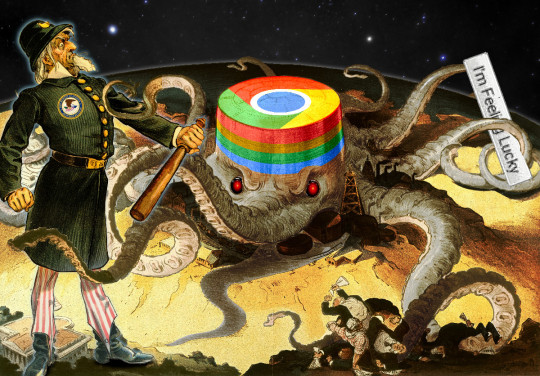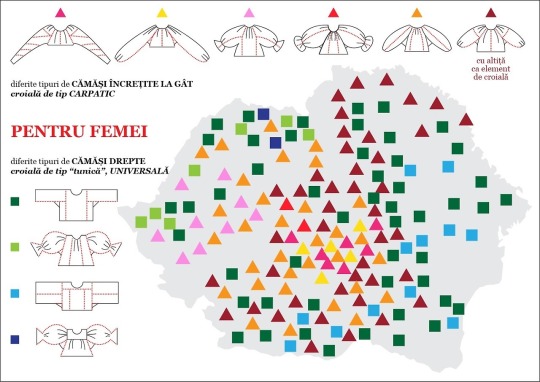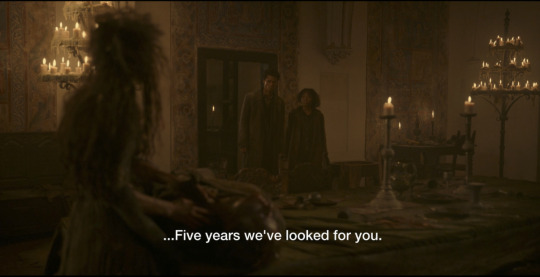#eff google
Explore tagged Tumblr posts
Text
online resources
Google is so powerful that it "hides" other search systems from us. We just don't know the existence of most of them.
Meanwhile, there are still a huge number of excellent searchers in the world who specialize in books, science, other smart information.
Here's a list of sites you may have never heard of!
www.refseek.com - Academic Resource Search. More than a billion sources: encyclopedia, monographies, magazines.
www.worldcat.org - a search for the contents of 20 thousand worldwide libraries. Find out where lies the nearest rare book you need.
https://link.springer.com - access to more than 10 million scientific documents: books, articles, research protocols.
www.bioline.org.br is a library of scientific bioscience journals published in developing countries.
http://repec.org - volunteers from 102 countries have collected almost 4 million publications on economics and related science.
www.science.gov is an American state search engine on 2200+ scientific sites. More than 200 million articles are indexed.
www.base-search.net is one of the most powerful researches on academic studies texts. More than 100 million scientific documents,
thanks Christopher Seymore for links
#online resources#eff google#research#libraries#online library resources#studies#academic studies#scientific studies#bioscience
13 notes
·
View notes
Text
Welcome to Sanremo 2025 green carpet! We have:
A grieving widow at the funeral of her 5th husband

Unconventional bride

Unconventional bride's bride

Your aunt and uncle on a date night

Miley Cyrus

10 y.o. girl raiding mom's closet

10 y.o. boy raiding mom's closet

Hailey Williams in her best era

Mom warned you about them

How dare you question my emotional support medieval helmet?!!

Enjoy your stay!
#sanremo#sanremo 2025#sanremo2025#sanremo green carpet#achille lauro#clara#gaia#coma_cose#coma cose#serena brancale#sarah toscano#tony effe#rose villain#shablo#i'm not going to google what the other three are called#irama#irama's medieval helmet
334 notes
·
View notes
Text
Skinnamarinkstump Linkdump

I'm on a 20+ city book tour for my new novel PICKS AND SHOVELS. Catch me TODAY (Feb 15) for a virtual event with YANIS VAROUFAKIS, and on MONDAY (Feb 17) for an event at KEPLER'S in MENLO PARK with CHARLIE JANE ANDERS. More tour dates here.

It's Saturday and I'm on a book tour, and the world is in chaos, and there are more links to write about than I could fit in to this week's newsletter, so time for a cubic linkdump, the 27th such:
https://pluralistic.net/tag/linkdump/
Let's start with the best thing I saw all week: a 3D-printed, spring-loaded, clockwork chess pawn that uses a magnet to sense when it has reached the end of the board and SPROING! turns into a queen:
https://www.youtube.com/watch?v=CSOnnle3zbA
The whole video is a fascinating account of the design process, from idea to prototype to finished item, but if you're impatient and want to skip right to the eyeball kick, it's at 12:27-12:35. And if you want to print your own, the files are $12 (cheap!):
https://www.patreon.com/WorksByDesign/shop/queen-pawn-3d-printing-files-614491?source=storefront
Regrettably, not every tech project is a good one. This week, Google abandoned its AI ethics pledge. Unlike most AI ethics pledge, which are full of nonsense about not accidentally creating a vengeful god that turns the human race into paperclips, Google's AI pledge was actually very important, in that the company promised not to make AI that violates human rights, international law, or privacy. There comes a point where harping on Google's abandoned "don't be evil" motto can feel a little hacky, but in this case, I'll make an exception. My EFF colleague Matthew Guariglia tears Google a much-deserved new AIhole over this latest heel turn:
https://www.eff.org/deeplinks/2025/02/google-wrong-side-history
Not all bad technology is evil. Some of it is merely very, very stupid. How stupid? Check out Thom Dunn's Wirecutter review of The Heatbit Trio, a space-heater that uses Bitcoin-mining GPUs to generate some of its heat, very slightly offsetting the cost of warming your room – but at a rate that would take decades to recoup the $700 price-tag. Thom got some spicy quotes from Molly White for this one – possibly the first time she's been cited in a home appliance review:
https://www.nytimes.com/wirecutter/reviews/heatbit-space-heater-review/
Staying with crypto freaks for a moment here, Adam Levitin dissects the cryptocurrency "industry"'s latest chorus of aggrieved whining over "debanking":
https://www.creditslips.org/creditslips/2025/02/debanked-by-the-market.html
As Levitin writes, banks aren't kicking cryptocurrency "companies" off their books because the government wants to punish them. Banks have a very good reason to want to avoid doing business with high-dollar scams that have highly correlated implosions, which is to say, times when everyone wants their money back from the cryptocurrency "company" the bank is handling charges for. For a longer explanation that gets into the nitty gritty of bank supervision, check out Patio11's excellent, detailed explainer:
https://www.bitsaboutmoney.com/archive/debanking-and-debunking/
As all the real heads know, "crypto means cryptography," and cryptographers continue to contrive privacy marvels. This week, Kagi – the best search engine, a million times better than Google – released a Privacy Pass authentication plugin, which lets you login to Kagi and run searches without Kagi being able to connect any of the searches you make with your account:
https://blog.kagi.com/kagi-privacy-pass
As an sf/crime writer who sometimes (often) searches for information on committing ghastly crimes and 'orrible murders, the fact that my favorite search engine will be technically incapable of tying those searches to my identity is quite a relief. Read my review of Kagi here:
https://pluralistic.net/2024/04/04/teach-me-how-to-shruggie/#kagi
If you're one of those marvel-contriving hackers, cryptographers, security researchers or tinkerers, you should really consider attending this summer's Hackers on Planet Earth (HOPE), 2600 Magazine's (now) annual (formerly biennial) hacker con. They've just posted their CFP – get those submission in!
https://www.hope.net/cfp-talks.html
Well, I have to post this and get ready for this morning's virtual book tour event with Yanis Varoufakis:
https://www.youtube.com/watch?v=xkIDep7Z4LM
But before I go, one more link: Kevin Steele's 2005 essay on Hypercard, "When Multimedia Was Black & White," an absolute classic, and a beautiful meditation on the art and promise of early hypertext:
https://web.archive.org/web/20240213190609/http://www.kevinsteele.com/smackerel/black_white_00.html
I've known Kevin for most of my life, long before he helped found Mackerel, the pioneering Toronto multimedia company. Long after Mackerel, Kevin went on making wonderful things. In 2023, he published a monumental act of portraiture – a "sequential art" time-series of panoramas of Toronto's hip, ever-changing Queen Street West strip:
https://pluralistic.net/2023/09/13/spadina-to-bathurst/#dukes-cycle
Comparing Kevin's more recent work with that lovely old essay reveals deep correspondences and the progress of a unique and creative soul.

If you'd like an essay-formatted version of this post to read or share, here's a link to it on pluralistic.net, my surveillance-free, ad-free, tracker-free blog:
https://pluralistic.net/2025/02/15/intermixture/#debunking-debanking

#pluralistic#bitcoin#kevin steele#mulitmedia#patio11#adam levitin#thom dunn#eff#wirecutter#linkdump#linkdumps#google#ai#dont be evil#hope#hackers on planet earth#hackercons#privacy pass#kagi#search#debanking#chess#3d printing#clockworks
152 notes
·
View notes
Text
me: *opens an email*
Google pop-up: HEYYY DID YOU KNOW YOU CAN SNOOZE AN EMAIL SO YOU CAN READ IT LATER? LET ME SHOW YOU!!!!!!! *closes the email*
me: ... I was about to read that
4 notes
·
View notes
Text
I googled "nuclear bomb" for funny meme purposes and accidentally clicked "products" instead of photos

Ugh. Weekend plans cancelled joke cancelled I'm probably on some kind of list now
4 notes
·
View notes
Text
Google Does Yet Another Infuriating Thing
Google is looking for women to be "Google Tech Ambassadors".
Ambassadors are expected to do at least 10 hours of work per quarter—for free.
From the site:


Opportunities like this already exist. Google is not doing anything new with this initiative.
Google is not offering meaningful opportunities or practical support.
Google is asking people who are already overscheduled to take on more work on an unpaid basis.
As one of my colleagues replied, "It's a shame Google isn't a huge company that could afford to remunerate women for their efforts".
Google could take this idea and put resources towards supporting the programs that already exist and need funding and practical support.
This is not helping women in tech advance their careers.
This is not growing the tech community.
This is yet another company asking women to work for free in order to bolster its own image.
8 notes
·
View notes
Text
When a company makes a promise, the public should be able to rely on it. Today, nearly every person in the U.S. is a customer of either Amazon or Google—and many of us are customers of both technology giants. Both of these companies have made public promises that they will ensure their technologies are not being used to facilitate human rights violations. These promises are not just corporate platitudes; they’re commitments to every customer and to society at large.
It’s a reasonable thing to ask if these promises are being kept. And it’s especially important since Amazon and Google have been increasingly implicated by reports that their technologies, specifically their joint cloud computing initiative called Project Nimbus, are being used to facilitate mass surveillance and human rights violations of Palestinians in the Occupied Territories of the West Bank, East Jerusalem, and Gaza. This was the basis of our public call in August 2024 for the companies to come clean about their involvement.
#surveillance capitalism#us politics#big tech#privacy#ai#google#amazon#eff#electronic frontier foundation#project nimbus#genocide#palestine#israel#surveillance
3 notes
·
View notes
Text
i haven’t used this app in a VERY long time, trying to get away from Twitter and instagram and go back to where shit made sense. Like this and Google+.
1 note
·
View note
Text
When nobody else has got me I know the EFF has got me:
Even if a court concludes that a model is a derivative work under copyright law, creating the model is likely a lawful fair use. Fair use protects reverse engineering, indexing for search engines, and other forms of analysis that create new knowledge about works or bodies of works.
- How we think about Copyright and AI Art
A model is a collection of information about what has been expressed, specifically what patterns emerge when many works are compared. To the extent training the model requires reproducing copyrightable expression, that copying has a different purpose and message than the creative works being analyzed to generate these observations. And, as Google v. Oracle teaches, a use that facilitates the creation of new works is more likely to be fair. As in Google, a model can be used for a range of expression informed by user prompts, conveying messages devised by users.
- Comments of EFF to Copyright Office re Generative AI - 2023
714 notes
·
View notes
Text
The Google antitrust remedy should extinguish surveillance, not democratize it

I'm coming to DEFCON! On FRIDAY (Aug 9), I'm emceeing the EFF POKER TOURNAMENT (noon at the Horseshoe Poker Room), and appearing on the BRICKED AND ABANDONED panel (5PM, LVCC - L1 - HW1–11–01). On SATURDAY (Aug 10), I'm giving a keynote called "DISENSHITTIFY OR DIE! How hackers can seize the means of computation and build a new, good internet that is hardened against our asshole bosses' insatiable horniness for enshittification" (noon, LVCC - L1 - HW1–11–01).

If you are even slightly plugged into the doings and goings on in this tired old world of ours, then you have heard that Google has lost its antitrust case against the DOJ Antitrust Division, and is now an official, no-foolin', convicted monopolist.
This is huge. Epochal. The DOJ, under the leadership of the fire-breathing trustbuster Jonathan Kanter, has done something that was inconceivable four years ago when he was appointed. On Kanter's first day on the job as head of the Antitrust Division, he addressed his gathered prosecutors and asked them to raise their hands if they'd never lost a case.
It was a canny trap. As the proud, victorious DOJ lawyers thrust their arms into the air, Kanter quoted James Comey, who did the same thing on his first day on the job as DA for the Southern District of New York: "You people are the chickenshit club." A federal prosecutor who never loses a case is a prosecutor who only goes after easy targets, and leave the worst offenders (who can mount a serious defense) unscathed.
Under Kanter, the Antitrust Division has been anything but a Chickenshit Club. They've gone after the biggest game, the hardest targets, and with Google, they bagged the hardest target of all.
Again: this is huge:
https://www.thebignewsletter.com/p/boom-judge-rules-google-is-a-monopolist
But also: this is just the start.
Now that Google is convicted, the court needs to decide what to do about it. Courts have lots of leeway when it comes to addressing a finding of lawbreaking. They can impose "conduct remedies" ("don't do that anymore"). These are generally considered weaksauce, because they're hard to administer. When you tell a company like Google to stop doing something, you need to expend a lot of energy to make sure they're following orders. Conduct remedies are as much a punishment for the government (which has to spend millions closely observing the company to ensure compliance) as they are for the firms involved.
But the court could also order Google to stop doing certain things. For example, since the ruling finds that Google illegally maintained its monopoly by paying other entities – Apple, Mozilla, Samsung, AT&T, etc – to be the default search, the court could order them to stop doing that. At the very least, that's a lot easier to monitor.
The big guns, though are the structural remedies. The court could order Google to sell off parts of its business, like its ad-tech stack, through which it represents both buyers and sellers in a marketplace it owns, and with whom it competes as a buyer and a seller. There's already proposed, bipartisan legislation to do this (how bipartisan? Its two main co-sponsors are Ted Cruz and Elizabeth Warren!):
https://pluralistic.net/2023/05/25/structural-separation/#america-act
All of these things, and more, are on the table:
https://www.wired.com/story/google-search-monopoly-judge-amit-mehta-options/
We'll get a better sense of what the judge is likely to order in the fall, but the case could drag out for quite some time, as Google appeals the verdict, then tries for the Supreme Court, then appeals the remedy, and so on and so on. Dragging things out in the hopes of running out the clock is a time-honored tradition in tech antitrust. IBM dragged out its antitrust appeals for 12 years, from 1970 to 1982 (they called it "Antitrust's Vietnam"). This is an expensive gambit: IBM outspent the entire DOJ Antitrust Division for 12 consecutive years, hiring more lawyers to fight the DOJ than the DOJ employed to run all of its antitrust enforcement, nationwide. But it worked. IBM hung in there until Reagan got elected and ordered his AG to drop the case.
This is the same trick Microsoft pulled in the nineties. The case went to trial in 1998, and Microsoft lost in 1999. They appealed, and dragged out the proceedings until GW Bush stole the presidency in 2000 and dropped the case in 2001.
I am 100% certain that there are lawyers at Google thinking about this: "OK, say we put a few hundred million behind Trump-affiliated PACs, wait until he's president, have a little meeting with Attorney General Andrew Tate, and convince him to drop the case. Worked for IBM, worked for Microsoft, it'll work for us. And it'll be a bargain."
That's one way things could go wrong, but it's hardly the only way. In his ruling, Judge Mehta rejected the DOJ's argument that in illegally creating and maintaining its monopoly, Google harmed its users' privacy by foreclosing on the possibility of a rival that didn't rely on commercial surveillance.
The judge repeats some of the most cherished and absurd canards of the marketing industry, like the idea that people actually like advertisements, provided that they're relevant, so spying on people is actually doing them a favor by making it easier to target the right ads to them.
First of all, this is just obvious self-serving rubbish that the advertising industry has been repeating since the days when it was waging a massive campaign against the TV remote on the grounds that people would "steal" TV by changing the channel when the ads came on. If "relevant" advertising was so great, then no one would reach for the remote – or better still, they'd change the channel when the show came back on, looking for more ads. People don't like advertising. And they hate "relevant" advertising that targets their private behaviors and views. They find it creepy.
Remember when Apple offered users a one-click opt-out from Facebook spying, the most sophisticated commercial surveillance system in human history, whose entire purpose was to deliver "relevant" advertising? More than 96% of Apple's customers opted out of surveillance. Even the most Hayek-pilled economist has to admit that this is a a hell of a "revealed preference." People don't want "relevant" advertising. Period.
The judge's credulous repetition of this obvious nonsense is doubly disturbing in light of the nature of the monopoly charge against Google – that the company had monopolized the advertising market.
Don't get me wrong: Google has monopolized the advertising market. They operate a "full stack" ad-tech shop. By controlling the tools that sellers and buyers use, and the marketplace where they use them, Google steals billions from advertisers and publishers. And that's before you factor in Jedi Blue, the illegal collusive arrangement the company has with Facebook, by which they carved up the market to increase their profits, gouge advertisers, starve publishers, and keep out smaller rivals:
https://en.wikipedia.org/wiki/Jedi_Blue
One effect of Google's monopoly power is a global privacy crisis. In regions with strong privacy laws (like the EU), Google uses flags of convenience (looking at you, Ireland) to break the law with impunity:
https://pluralistic.net/2023/05/15/finnegans-snooze/#dirty-old-town
In the rest of the world, Google works with other members of the surveillance cartel to prevent the passage of privacy laws. That's why the USA hasn't had a new federal privacy law since 1988, when Congress acted to ban video-store clerks from telling newspaper reporters about the VHS cassettes you took home:
https://en.wikipedia.org/wiki/Video_Privacy_Protection_Act
The lack of privacy law and privacy enforcement means that Google can inflict untold privacy harms on billions of people around the world. Everything we do, everywhere we go online and offline, every relationship we have, everything we buy and say and do – it's all collected and stored and mined and used against us. The immediate harm here is the haunting sense that you are always under observation, a violation of your fundamental human rights that prevents you from ever being your authentic self:
https://www.theguardian.com/technology/blog/2013/jun/14/nsa-prism
The harms of surveillance aren't merely spiritual and psychological – they're material and immediate. The commercial surveillance industry provides the raw feedstock for a parade of horribles, from stalkers and bounty hunters turning up on their targets' front doors to cops rounding up demonstrators with location data from their phones to identity thieves tricking their marks by using leaked or purchased private information as convincers:
https://pluralistic.net/2023/12/06/privacy-first/#but-not-just-privacy
The problem with Google's monopolization of the surveillance business model is that they're spying on us. But for a certain kind of competition wonk, the problem is that Google is monopolizing the violation of our human rights, and we need to use competition law to "democratize" commercial surveillance.
This is deeply perverse, but it represents a central split in competition theory. Some trustbusters fetishize competition for its own sake, on the theory that it makes companies better and more efficient. But there are some things we don't want companies to be better at, like violating our human rights. We want to ban human rights violations, not improve them.
For other trustbusters – like me – the point of competition enforcement isn't merely to make companies offer better products, it's to make companies small enough to hold account through the enforcement of democratic laws. I want to break – and break up – Google because I want to end its ability to bigfoot privacy law so that we can finally root out the cancer of commercial surveillance. I don't want to make Google smaller so that other surveillance companies can get in on the game.
There is a real danger that this could emerge from this decision, and that's a danger we need to guard against. Last month, Google shocked the technical world by announcing that it would not follow through on its years-long promise to kill third-party cookies, one of the most pernicious and dangerous tools of commercial surveillance. The reason for this volte-face appears to be concern that the EU would view killing third-party cookies as anticompetitive, since Google intended to maintain commercial surveillance using its Orwellian "Privacy Sandbox" technology in Chrome, with the effect that everyone except Google would find it harder to spy on us as we used the internet:
https://www.thebignewsletter.com/p/googles-trail-of-crumbs
It's true! This is anticompetitive. But the answer isn't to preserve the universal power of tech companies large and small to violate our human rights – it's to ban everyone, especially Google, from spying on us!
This current in competition law is still on the fringe, but the Google case – which finds the company illegally dominating surveillance advertising, but rejects the idea that surveillance is itself a harm – offers an opportunity for this bad idea to go from the fringe to the center.
If that happens, look out.
Take "attribution," an obscure bit of ad-tech jargon disguising a jaw-droppingly terrible practice. "Attribution" is when an ad-tech company shows you an ad, and then follows you everywhere you go, monitoring everything you do, to determine whether the ad convinced you to buy something. I mean that literally: they're combining location data generated by your phone and captured by Bluetooth and wifi receivers with data from your credit card to follow you everywhere and log everything, so that they can prove to a merchant that you bought something.
This is unspeakably grotesque. It should be illegal. In many parts of the world, it is illegal, but it is so lucrative that monopolists like Google can buy off the enforcers and get away with it. What's more, only the very largest corporations have the resources to surveil you so closely and invasively that they can perform this "service."
But again, some competition wonks look at this situation and say, "Well, that's not right, we need to make sure that everyone can do attribution." This was a (completely mad) premise in the (otherwise very good) 2020 Competition and Markets Authority market-study on "Online platforms and digital advertising":
https://assets.publishing.service.gov.uk/media/5fa557668fa8f5788db46efc/Final_report_Digital_ALT_TEXT.pdf
This (again, otherwise sensible) document veers completely off the rails whenever the subject of attribution comes up. At one point, the authors propose that the law should allow corporations to spy on people who opt out of commercial surveillance, provided that this spying is undertaken for the sole purpose of attribution.
But it gets even worse: by the end of the document, the authors propose a "user ID intervention" to give every Briton a permanent, government-issued advertising identifier to make it easier for smaller companies to do attribution.
Look, I understand why advertisers like attribution and are willing to preferentially take their business to companies that can perform it. But the fact that merchants want to be able to peer into every corner of our lives to figure out how well their ads are performing is no basis for permitting them to do so – much less intervening in the market to make it even easier so more commercial snoops can get their noses in our business!
This is an idea that keeps popping up, like in this editorial by a UK lawyer, where he proposes fixing "Google's dominance of online advertising" by making it possible for everyone to track us using the commercial surveillance identifiers created and monopolized by the ad-tech duopoly and the mobile tech duopoly:
https://www.thesling.org/what-to-do-about-googles-dominance-of-online-advertising/
Those companies are doing something rotten. In dominating ads, they have stolen billions from publishers and advertisers. Then they used those billions to capture our democratic process and ensure that our human rights weren't being defended as they plundered our private data and put us in harm's way.
Advertising will adapt. The marketing bros know this is coming. They're already discussing how to live in a world where you can't measure clicks and you can't attribute actions (e.g. the world from the first advertisements up until the early 2000s):
https://sparktoro.com/blog/attribution-is-dying-clicks-are-dying-marketing-is-going-back-to-the-20th-century/
An equitable solution to Google's monopoly will not run though our right to privacy. We don't solve the Google monopoly by creating competition in surveillance. The reason to get rid of Google's monopoly is to make it easier to end surveillance.

If you'd like an essay-formatted version of this post to read or share, here's a link to it on pluralistic.net, my surveillance-free, ad-free, tracker-free blog:
https://pluralistic.net/2024/08/07/revealed-preferences/#extinguish-v-improve

Image: Cryteria (modified) https://commons.wikimedia.org/wiki/File:HAL9000.svg
CC BY 3.0 https://creativecommons.org/licenses/by/3.0/deed.en
#pluralistic#google#antitrust#monopolies#remedies#ad-tech#competition#power#doj v google#attribution
1K notes
·
View notes
Text
Uhhh potential? Maybe?? The desire? HELL no. I just wanna write my stories and not get people eaten by the void of space. And maybe make people who look at my Google search history concerned (mostly looking up writing and/or drawing references).

look away
#unreality#Librarian chats#I'm not writing any Leitners I swear#genuinely#avatarsona#tma sideblog#in character#eff Leitner#writer#i write things#look at my Google search history at your own risk#my intrusive thoughts are story ideas
26K notes
·
View notes
Text
YouTube says it will intentionally cripple the playback of its videos in third-party apps that block its ads. A Monday post in YouTube's help forum notes netizens using applications that strip out adverts while streaming YouTube videos may encounter playback issues due to buffering or error messages indicating that the content is not available. "We want to emphasize that our terms don’t allow third-party apps to turn off ads because that prevents the creator from being rewarded for viewership, and Ads on YouTube help support creators and let billions of people around the world use the streaming service," said a YouTube team member identified as Rob. "We also understand that some people prefer an entirely ad-free experience, which is why we offer YouTube Premium." This crackdown is coming at the API level, as these outside apps use this interface to access the Google-owned giant's videos. Last year, YouTube acknowledged it was running scripts to detect ad-blocking extensions in web browsers, which ended up interfering with Firefox page loads and prompted a privacy complaint to Ireland's Data Protection Commission. And several months before that, the internet video titan experimented with popup notifications warning YouTube web visitors that ad-blocking software is not allowed. A survey published last month by Ghostery, a maker of software that promotes privacy by blocking ads and tracking scripts, found that Google's efforts to crack down on ad blocking made about half of respondents (49 percent) more willing to use an ad blocker. According to the survey, the majority of Americans now use advert blockers, something recommended by the FBI when conducting internet searches.
Download NewPipe, it's what I use on Android
276 notes
·
View notes
Text
IWTV S2 Ep1 Musings - Daciana: History through Visual Context in Ploiești, Romania
I immediately fell in love with The Vampire Daciana & her Romanian castle, and wanted to know more about it all.
We already know how much the set/costume designers on IWTV looooove attention to detail; they tell whole stories just through architecture, furniture, clothes, etc. So I was like OK, AMC, I see you; lemme start doing some reading up on Romania, so I can try to figure out what might be going on with Daciana. (Warning: I know eff all about Romania or Eastern Europe.)
ROMANIA

Map of Romania. Ploiești's the dot just under Muntenia, north of Bucharest, the capital. Ploiești's part of Wallachia, the IRL kingdom of Vlad Tepes (aka Dracula). Louis & Claudia went there in the 1940s, so I hope this map is accurate enough. (There's this map, but I dunno the date.)
DACIANA


The most obvious thing about her is that she's not dressed in the typical traditional Romanian folk clothing I see all over Google, full of white-red-blue/black palettes.

Daciana's not following traditional 19th/20th-century Romanian nationalist images. Her green/brown palette & silhouette is telling, as she lacks the puffy white blouses & dark skirts. (Despite her name, I'm ruling out her being Dacian (X X)--you think you're FUNNY, AMC! But IDK about Cezare Romulo (X X); might do a Pt2!)
Sleeves
First thing's her trailing slashed open sleeves, which were screaming Medieval! at me. Here's some 15th century Renaissance examples, but with surcoats, which is different, but the sleeves reminded me of hers so IDFK.

We could chalk this up to Daciana's design as just generic "medieval" fairytale stuff and keep it moving. But to give her a fair shake, I looked at local examples for anything similar that's more recent.

Traditional clothing from Huedin, Romania (north Transylvania), (X X).

Traditional clothing from Cluj, Romania (north Transylvania).
Keep Transylvanian/Muntenian cross-cultural contacts in mind when we get to Daciana's castle, cuz it's important!

Wrt rarer non-puffy sleeves, the square cut (light blue) seems to be more prevalent in Wallachia/Moldavia/Bessarabia (southern & eastern Romania); while the rectangular cut (dark green) is all over Romania, but definitely has a concentration in Wallachia & Moldavia.
And this makes sense, cuz the style seems to also be prevalent in 19th - 20th century Bulgaria, just south of Wallachia. Hrm....

Daciana's sleeves hang very long--the only example of super long sleeves I could find is a 19th century one at the Met (C.I.47.3.4a–d). The only example of slashed sleeves I could find is in this museum exhibit at Bran Castle (yes, THE Bran Castle--I'll get to it in a minute!)

Belt, Bodice, & Fabric

Daciana's belt is so plain compared to everything else. Is it supposed to be a leather Romanian chimir (worn by mountain/forest folk)? Those are only worn by men though? Or it depends? Or is it a just a plain cloth belt? It's reminding me of these examples (X X):

I wish I could see more of Daciana's bodice, if there's any particular kind of cut or patterns. Is the diamond netted/knotted/roped pattern on her arms significant? Her fabric is interesting, too:

What's this embroidery? Brocade? (Byzantine-Renaissance?) Damask? (c. 14th-16th century?) Lace? Something else? My brain wants to assume it's imported? Meaning: she's hella rich. Cuz like, the traditional Romanian blouse & skirt used to belong solely to peasants, b4 19th-20th century aristocrats started wearing it, too.


IDKY--more reading led me to a whole bunch of complicated stuff, that can probably be simplified by just saying: The Ottomans. XD


The pre-19th century Romanian aristocracy wore super opulent clothes, inspired by not just the Ottomans (X), but also the Byzantine Greeks (via 18th century Romanian Phanariote boyars (X X X)), etc. But aside from the hanging sleeves, Daciana's dress doesn't really resemble any of these foreign examples. However, it does track with my theory that Daciana predates the 19th-century Romanian nationalist/traditional clothes that became so iconic later on.
Like Louis & Claudia did, let's follow Daciana to her castle! ^0^
DACIANA'S CASTLE

I NEED to know if AMC filmed on location in Romania, or if Daciana's castle is just a studio set/green screen.
The interior's nowhere near what I expected, considering Daciana's haggard appearance. It's really nice--clean & tidy. No spiderwebs, no chipped plaster/paint, not even any bloodstains--but I've mentioned before that I think it's indicating that Daciana's a mother who takes better care of her home (and "child") than herself.
Archway
The first thing is the arch when they first come in (noticeable mostly cuz of how Louis had to bend down to get in, he's so tall).

These types of doors/arches are called "shouldered arches," dating from the Medieval-Gothic periods, which Europeans adapted from Islamic architecture during the medieval Crusades. (Examples inc. Lainici Monastery in Wallachia, and the Academy of Art in Cluj-Napoca (north Transylvania).)

The left pic's Biertan Fortified Church, in Sibiu (south Transylvania). (Another door.) The right pic's Bran Castle, in Brasov (south Transylvania). (Another door.) (Vlad Tepes/Dracula historically never owned this castle, but pop culture says otherwise.) Both places were built by the German/Saxon Transylvanians in the 14th-16th centuries; which might help date Daciana's castle, if not Daciana herself? (The Saxon Transylvanians were in Wallachia, too.)
Wall Ornamentation
The last thing I'll discuss is the wall ornamentation/decoration:


The painted floral trim everywhere instantly reminded me of The Witcher 3, as found in Hungarian, Polish, Ukranian etc buildings. Apparently the designs are all related to fertility, growth/luck, and the Tree of Life. Walls (X X X) and doors (X X) were painted. You can see northern Romanian painted ornamentation in Suceava (Bukovina).

There's painted wall designs in southern Romania, too.

"The research of the popular interior in the Argeş and Muscel areas leads to the determination, along with a local specificity, and some Transylvanian influences, in the contact areas between southern Transylvania and northern Muntenia. In the researched areas, two lines of development of the popular interior can be observed, one relatively simple and the other complex. If the first is the prerogative of a typical Subcarpathian interior, the second represents a distinctly Transylvanian form, which was also imposed due to the presence of the Transylvanian population in the south of the Carpathians, settled in numerous villages." -- (Google Translated from Arta populară din zonele Argeș și Muscel, 1967)
(The website RomaniaDacia has A LOT to say about Transylvania, and the impact of the Germans, Saxons, Hungarians, etc on Wallachia & the rest of Romania.)

Sure enough, I was finding way more carved ornamentation (X X X X X X) than painted ones.

But I wonder if that's why a lot of southern traditional Romanian interiors I've been finding have totally plain whitewashed walls, too, with no painted ornaments, just tapestries (X X). I did find Romanian interior floral wall painted trims (X), but not nearly as much.

Cuz actually, the closest comparanda I was finding for Daciana was Northern European rosemaling (X X), which is also giving me medieval vibes (X); specifically: trims on illuminated manuscripts like the Book of Hours (X X X)--which we know from Lestat in S01E06.

And we do see some Romanian medieval fresco borders & frescoes that had been plastered over & whitewashed, in Biertan's 15th century churches, and in 13th-15th century Darjiu (Transylvania).

So, I wouldn't be surprised if a lot of Romanian buildings (especially castles with whitewashed plastered walls) were formerly painted similar to Daciana's. Unfortunately, I just can't find an example or figure out what AMC might've been inspired by--Romania has hundreds of castles & churches.
So, I'm tapping out--this is the most I could find so far. U_U
Results? Inconclusive! 😭 My Google-fu has failed me, LOL!
I still have no idea what time period Daciana could be from. We could go several routes:
Go by her name, and say she's ooooold AF, an actual Dacian. She's just been collating Eastern European culture as she ages, but stopped at some point (as her mind deteriorated)
She's medieval, somewhere roundabouts the 14th-16th century (making her ~500 years old, the same age as Armand--but she's weaker (as I've theorized b4), which is why she was able to burn herself up.)
Settle on her being a local Wallachian from Southern Romania, likely pre-19th century / pre-industrial early-modern Europe
Handwave everything aside as Renn-Faire fairytale fantasy; let the tale seduce you~!
OR, we can just bully AMC until they give us an extended BTS look at how Daciana was conceptualized, telling us all the tea about her! 😈
#interview with the vampire#iwtv tvc metas#fashion history#architecture#medieval europe#read a dang history book#the vampire daciana
94 notes
·
View notes
Note
sometimes jude gives himbo vibes (lets never forget he thinking mexican was a language lol) so what about headcanons of himbo jude and smart reader? I think this could be fun 😂😅
jude bellingham testing his partners patience could be like…:
you try your very best to help jude and his friend, gio, as much as you can when it comes to freshen up their general knowledge. you try. however, as soon as you talk about the first topic, a huge discussion erupts with both of them talking as loud as possible, trying to get their points through. and somehow you always end up in the middle, both of them trying to get to tell the other that their opinion is wrong.
“bro, a piranha could kill you.” gio laughs, looking at jude who only shakes his head scoffing with his hand squeezing your thigh. “not me, though.” he denies, now looking at you, in hopes that you would back him up. “don’t look at me like that, love, of course they can.” - “you should support me instead of that geezer!” he exclaims, offended that you would betray him like that. “bro, why wouldn’t it? have you seen them?” gio continued, not believing that his friend could be this naïve. “i’ll just swim away.” jude shrugged. both gio and you looked at him flabbergasted, no words found to describe how disappointed you felt.
explaining him different theories throughout the day, whether it was biology related or historical, became the new norm for you. it almost felt like playing teacher/pupil. jude somehow always comes up with the most interesting (?) questions ever. and instead of googling it or whatever, his first reaction is to go to you, the smartest person he knew. “babe, what did they say about the giraffe necks again?” - “babe, how can genes skip a generation? do they just, i don’t know, wait?” - “bro, what do you mean the proteins dissolve in heat?” you have to be patient, but also couldn’t help but coo at your boyfriends confused expression.
he uses your wide spectrum of vocabulary to roast his teammates or jobe in the group chat, never in real life, since he wouldn’t be able to pronounce everything correctly for the first time. it is usually in the evening, the two of you laying on the couch, a tv show softly playing in the background. “yo,” jude speaks up, his face focused on his phone, eyebrows drawn together and lips agape, “how do i say that he can go fuck himself and that i don’t care that he doesn’t want to do it, but, like, make it sound smart.” - “jude, what are you doing?”
sometimes, when his cluelessness gets too much for you to handle, you usually walk away, to a different room or something. just, something so you wouldn’t hit judes pretty little head with the next slipper you found. though, he is really mature and is able to keep a conversation flowing, he’d sometimes say something so out of pocket that one would have to be left alone for a while, just so you could comprehend what had happened. and jude would follow you, not giving you a chance to escape his weirdness, “bruh, c’mon it wasn’t that bad.” he’d laugh, his hands closed around your arm to pull you against his chest. “no, please.” you shake your head, trying to break free, “i can’t do this today.” -“babe! don’t be so mean.” - “love, what do you mean you thought mexican was a language? please, don’t do this to me.” hearing you say that caused him to laugh even more, eyes closed and head thrown back.
———————————
himbo bee effs for the win

#football one shot#football x reader#x reader#jude bellingham#jude bellingham x reader#jude bellingham imagine#jude bellingham one shot#football#jude bellingham x you#jude bellingham fluff
602 notes
·
View notes
Text
Now what?
First things first, protect yourself. Even if you think the threat of authoritarianism is overblown, take steps to defend against it. If you’re a journalist, maybe read this section twice.
Find your communities. Most people have many communities: the friend group you hang out with in real life, your family, your neighbors, your internet friends, your coworkers, your church or synagogue or mosque or other religious community. Strengthen these communities. If you don’t feel like you have much in the way of community, begin forming them: join new social groups, and try to meet likeminded people near you. Introduce yourself to your neighbors.
Join (or start) a union. There’s strength in numbers, and especially if your industry may fall under threat, you’ll want to unionize now and not wait for that threat to materialize.
Consider taking proactive steps to obtain healthcare that could become challenging to obtain in the future, if you are able. For example, if you need to replace or are considering getting an IUD, now might be the time.
Use end-to-end-encrypted messaging apps for your communications. I use Signal heavily, but there are other options. Please know that not all apps that advertise E2EE enable it by default or offer it for group chats (looking at you Telegram), so double check that.
Consider choosing a VPN to help protect your privacy online, and learn about the pros and cons of using them. Learn when, why, and how to use Tor. The EFF has good guides depending on your operating system.
Consider reducing your reliance on centralized social networks controlled by billionaires, and instead establishing a web presence you control. Evaluate the risks when choosing hosting providers, make backups, and make it as easy as possible to switch hosts should the need arise.
Consider no longer using apps that collect and store sensitive data, such as period tracker or fertility apps. Be cautious about location tracking and other tech-enabled surveillance.
Find and support trusted sources of news and information. If you rely heavily on mainstream news outlets owned by billionaires who were first in line to congratulate Trump on his victory, consider diversifying your media diet. ProPublica, 404 Media, and Flaming Hydra are a couple of great publications, or the Institute for Nonprofit News has a great directory of many more. Subscribe to and/or financially support independent solo writers like Parker Molloy (The Present Age), Erin Reed, Marisa Kabas (The Handbasket), and Seamus Hughes (Court Watch). Pay for a subscription to your local newspaper. Maybe also subscribe to a non-US paper while you’re at it. Consider supplementing your social feeds with an RSS-powered blogroll.
#reference#surveillance capitalism#authoritarianism#billionaires#social media#news#information diet#ai#propublica#404media#eff#electronic frontier foundation#election 2024#us politics#big tech#artificial intelligence#privacy#technology#google#facebook#crypto#vpn#signal#resources#journalism#citation needed#molly white
6 notes
·
View notes
Text
English is my second language, and I've been in internet for a while, so when I saw word "ineffable" for the first time, I made a logical conclusion that "eff" stands for fuck, and ineffable means infuckable, something-I-can't-fuck
Which made suspiciously a lot of sense actually. I think the first time I've met this word, it was fanfiction, probably dpxdc. So there's some eldritch creature, and author describes all those fangs and claws and incomprehensible fear brought by being close to something like this, and then the word "ineffable" is used to describe the creature. And to me it looks like the narrator just sees something terrifying and magical and goes like "hm, this one even I won't be able to fuck". And I went with it!
I was like "yeah, makes sense". That's absolutely the first thing you think about when you meet a demonic creature so terrifying your mind can't comprehend it, obviously. And it's fanfiction after all, and writers here are known for being unhinged and kinda weird (not that I don't like it, I love weirdos), so yeah.
And I've met this word several times afterwards, and every time it made sense and didn't even change the meaning of text much!
I didn't realise until I saw ship's name "ineffable husbands". Does that mean that they're asexual? Is it some different layer of meaning, something about how cool they are? So I go to google, and, well, here I am. Writing a post.
#dpxdc#dcxdp#ineffable husbands#was it constantine summoning eldritch horror ghost king?#probably#felt in character for him#try to read something with ineffable with thinking about it my way#you'll never be the same
90 notes
·
View notes